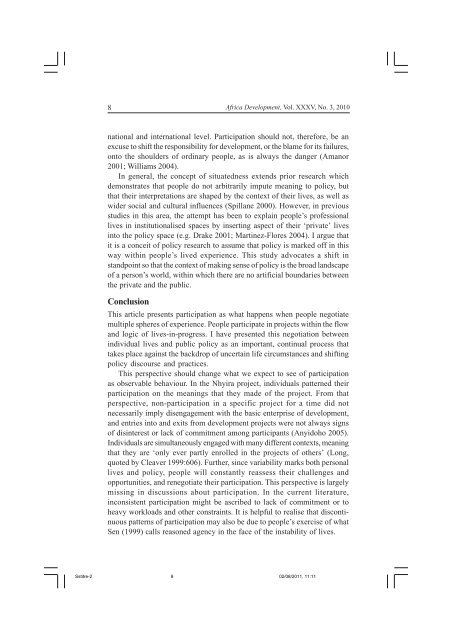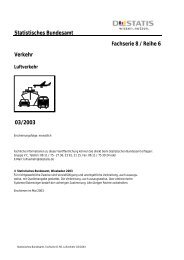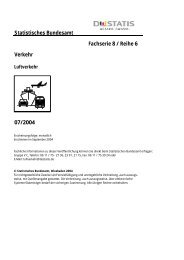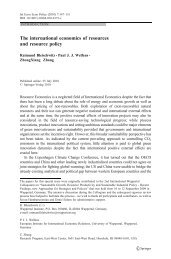lieux (publics) de ville » par les mots ou comment les murs - Index of
lieux (publics) de ville » par les mots ou comment les murs - Index of
lieux (publics) de ville » par les mots ou comment les murs - Index of
Create successful ePaper yourself
Turn your PDF publications into a flip-book with our unique Google optimized e-Paper software.
8 Africa Development, Vol. XXXV, No. 3, 2010<br />
national and international level. Participation sh<strong>ou</strong>ld not, therefore, be an<br />
excuse to shift the responsibility for <strong>de</strong>velopment, or the blame for its failures,<br />
onto the sh<strong>ou</strong>l<strong>de</strong>rs <strong>of</strong> ordinary people, as is always the danger (Amanor<br />
2001; Williams 2004).<br />
In general, the concept <strong>of</strong> situatedness extends prior research which<br />
<strong>de</strong>monstrates that people do not arbitrarily impute meaning to policy, but<br />
that their interpretations are shaped by the context <strong>of</strong> their lives, as well as<br />
wi<strong>de</strong>r social and cultural influences (Spillane 2000). However, in previ<strong>ou</strong>s<br />
studies in this area, the attempt has been to explain people’s pr<strong>of</strong>essional<br />
lives in institutionalised spaces by inserting aspect <strong>of</strong> their ‘private’ lives<br />
into the policy space (e.g. Drake 2001; Martinez-Flores 2004). I argue that<br />
it is a conceit <strong>of</strong> policy research to assume that policy is marked <strong>of</strong>f in this<br />
way within people’s lived experience. This study advocates a shift in<br />
standpoint so that the context <strong>of</strong> making sense <strong>of</strong> policy is the broad landscape<br />
<strong>of</strong> a person’s world, within which there are no artificial b<strong>ou</strong>ndaries between<br />
the private and the public.<br />
Conclusion<br />
This article presents <strong>par</strong>ticipation as what happens when people negotiate<br />
multiple spheres <strong>of</strong> experience. People <strong>par</strong>ticipate in projects within the flow<br />
and logic <strong>of</strong> lives-in-progress. I have presented this negotiation between<br />
individual lives and public policy as an important, continual process that<br />
takes place against the backdrop <strong>of</strong> uncertain life circumstances and shifting<br />
policy disc<strong>ou</strong>rse and practices.<br />
This perspective sh<strong>ou</strong>ld change what we expect to see <strong>of</strong> <strong>par</strong>ticipation<br />
as observable behavi<strong>ou</strong>r. In the Nhyira project, individuals patterned their<br />
<strong>par</strong>ticipation on the meanings that they ma<strong>de</strong> <strong>of</strong> the project. From that<br />
perspective, non-<strong>par</strong>ticipation in a specific project for a time did not<br />
necessarily imply disengagement with the basic enterprise <strong>of</strong> <strong>de</strong>velopment,<br />
and entries into and exits from <strong>de</strong>velopment projects were not always signs<br />
<strong>of</strong> disinterest or lack <strong>of</strong> commitment among <strong>par</strong>ticipants (Anyidoho 2005).<br />
Individuals are simultane<strong>ou</strong>sly engaged with many different contexts, meaning<br />
that they are ‘only ever <strong>par</strong>tly enrolled in the projects <strong>of</strong> others’ (Long,<br />
quoted by Cleaver 1999:606). Further, since variability marks both personal<br />
lives and policy, people will constantly reassess their challenges and<br />
opportunities, and renegotiate their <strong>par</strong>ticipation. This perspective is largely<br />
missing in discussions ab<strong>ou</strong>t <strong>par</strong>ticipation. In the current literature,<br />
inconsistent <strong>par</strong>ticipation might be ascribed to lack <strong>of</strong> commitment or to<br />
heavy workloads and other constraints. It is helpful to realise that discontinu<strong>ou</strong>s<br />
patterns <strong>of</strong> <strong>par</strong>ticipation may also be due to people’s exercise <strong>of</strong> what<br />
Sen (1999) calls reasoned agency in the face <strong>of</strong> the instability <strong>of</strong> lives.<br />
Sstitre-2 8<br />
02/08/2011, 11:11








